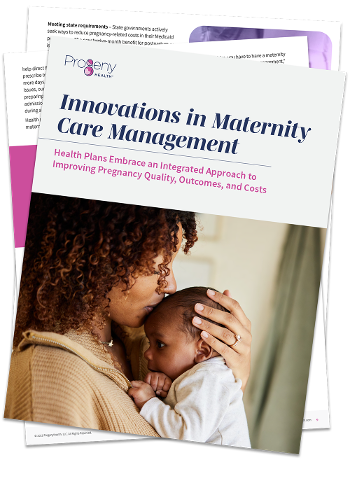 Filed Under: Innovation | Maternal Health
Filed Under: Innovation | Maternal HealthInnovations in Maternity Care Management

One of every ten babies in the United States is born prematurely. Despite advances in medical technology that improve the rate of successful births, maternal morbidity and costs associated with pregnancy and postpartum complications continue to climb.
An Integrated, Whole-Person Approach to Maternity Care Management
Today, integrated maternity management programs are helping organizations reduce premature births and congenital disabilities, lower pregnancy and postpartum-related costs, and improve health outcomes for the mother and newborn.
An integrated maternity program uses a multi-modal approach that includes:
- Timely member identification and engagement
- Risk stratification using comprehensive assessments
- App-based support for healthy pregnancies
- Telephonic case management that includes both pre- and postnatal support
- Support to solve social determinants of health and ensure health equity
- Extended care through the first 12 months after delivery

According to Dr. Ellie Stang, Founder and CEO of ProgenyHealth, “Health plans are partnering with innovators who are more proactive in managing maternity cases rather than reactive. They seek partners who can manage these cases holistically to drive quality outcomes for their members.”
Limitations of Traditional Maternity Management
Early concerns slip through the cracks – Health plans have long offered maternity programs, often focused on high-risk pregnancies. These programs have delivered mixed results due to low engagement and claims-driven identification models that are hampered by data availability and timeliness.
“That’s where we come in,” explains Dr. Linda Genen, Chief Medical Officer at ProgenyHealth. “We can identify pregnant members through Medicaid lists or use our team to reach out to members. We have a 98% enrollment rate from outreach phone calls.”
A Continuum of Maternity Care
Single source care management – Health plans have begun to embrace the entire continuum of maternity care. “I tell health plans, to have a successful program that manages moms and babies, you must have a maternity program plus a program focused on acute care management,” Dr. Stang explained. “We offer the continuum of services needed today, and these services work better together. Even if a traditional health plan has a maternity care management program, they don’t necessarily have deep expertise in managing a NICU case.”
The takeaway – Health plans, providers, and third parties are working together to reduce preterm births by engaging women early in the pregnancy journey. Using an integrated approach backed by personalized case management, a digital app, specialized expertise, and commitment to a new model of care, ProgenyHealth is delivering on its promise of improving the landscape of maternal, infant, and family health.
Get more details on how an integrated approach to maternity care management can improve pregnancy outcomes, quality, and costs.





 Prev
Prev